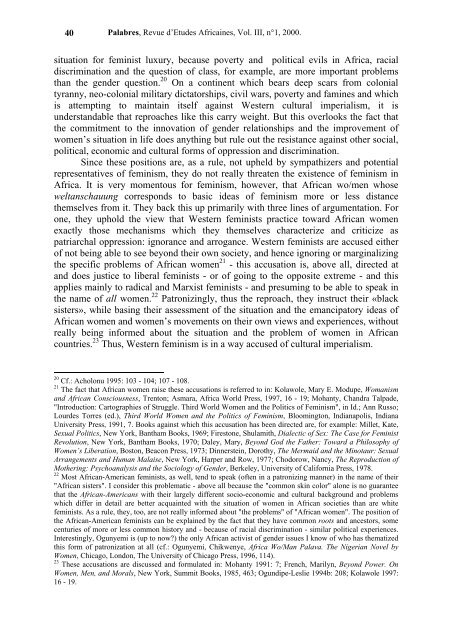Télécharger - Revue Palabres
Télécharger - Revue Palabres
Télécharger - Revue Palabres
Create successful ePaper yourself
Turn your PDF publications into a flip-book with our unique Google optimized e-Paper software.
40<br />
<strong>Palabres</strong>, <strong>Revue</strong> d’Etudes Africaines, Vol. III, n°1, 2000.<br />
situation for feminist luxury, because poverty and political evils in Africa, racial<br />
discrimination and the question of class, for example, are more important problems<br />
than the gender question. 20 On a continent which bears deep scars from colonial<br />
tyranny, neo-colonial military dictatorships, civil wars, poverty and famines and which<br />
is attempting to maintain itself against Western cultural imperialism, it is<br />
understandable that reproaches like this carry weight. But this overlooks the fact that<br />
the commitment to the innovation of gender relationships and the improvement of<br />
women’s situation in life does anything but rule out the resistance against other social,<br />
political, economic and cultural forms of oppression and discrimination.<br />
Since these positions are, as a rule, not upheld by sympathizers and potential<br />
representatives of feminism, they do not really threaten the existence of feminism in<br />
Africa. It is very momentous for feminism, however, that African wo/men whose<br />
weltanschauung corresponds to basic ideas of feminism more or less distance<br />
themselves from it. They back this up primarily with three lines of argumentation. For<br />
one, they uphold the view that Western feminists practice toward African women<br />
exactly those mechanisms which they themselves characterize and criticize as<br />
patriarchal oppression: ignorance and arrogance. Western feminists are accused either<br />
of not being able to see beyond their own society, and hence ignoring or marginalizing<br />
the specific problems of African women 21 - this accusation is, above all, directed at<br />
and does justice to liberal feminists - or of going to the opposite extreme - and this<br />
applies mainly to radical and Marxist feminists - and presuming to be able to speak in<br />
the name of all women. 22 Patronizingly, thus the reproach, they instruct their «black<br />
sisters», while basing their assessment of the situation and the emancipatory ideas of<br />
African women and women’s movements on their own views and experiences, without<br />
really being informed about the situation and the problem of women in African<br />
countries. 23 Thus, Western feminism is in a way accused of cultural imperialism.<br />
20 Cf.: Acholonu 1995: 103 - 104; 107 - 108.<br />
21 The fact that African women raise these accusations is referred to in: Kolawole, Mary E. Modupe, Womanism<br />
and African Consciousness, Trenton; Asmara, Africa World Press, 1997, 16 - 19; Mohanty, Chandra Talpade,<br />
"Introduction: Cartographies of Struggle. Third World Women and the Politics of Feminism", in Id.; Ann Russo;<br />
Lourdes Torres (ed.), Third World Women and the Politics of Feminism, Bloomington, Indianapolis, Indiana<br />
University Press, 1991, 7. Books against which this accusation has been directed are, for example: Millet, Kate,<br />
Sexual Politics, New York, Bantham Books, 1969; Firestone, Shulamith, Dialectic of Sex: The Case for Feminist<br />
Revolution, New York, Bantham Books, 1970; Daley, Mary, Beyond God the Father: Toward a Philosophy of<br />
Women’s Liberation, Boston, Beacon Press, 1973; Dinnerstein, Dorothy, The Mermaid and the Minotaur: Sexual<br />
Arrangements and Human Malaise, New York, Harper and Row, 1977; Chodorow, Nancy, The Reproduction of<br />
Mothering: Psychoanalysis and the Sociology of Gender, Berkeley, University of California Press, 1978.<br />
22 Most African-American feminists, as well, tend to speak (often in a patronizing manner) in the name of their<br />
"African sisters". I consider this problematic - above all because the "common skin color" alone is no guarantee<br />
that the African-Americans with their largely different socio-economic and cultural background and problems<br />
which differ in detail are better acquainted with the situation of women in African societies than are white<br />
feminists. As a rule, they, too, are not really informed about "the problems" of "African women". The position of<br />
the African-American feminists can be explained by the fact that they have common roots and ancestors, some<br />
centuries of more or less common history and - because of racial discrimination - similar political experiences.<br />
Interestingly, Ogunyemi is (up to now?) the only African activist of gender issues I know of who has thematized<br />
this form of patronization at all (cf.: Ogunyemi, Chikwenye, Africa Wo/Man Palava. The Nigerian Novel by<br />
Women, Chicago, London, The University of Chicago Press, 1996, 114).<br />
23 These accusations are discussed and formulated in: Mohanty 1991: 7; French, Marilyn, Beyond Power. On<br />
Women, Men, and Morals, New York, Summit Books, 1985, 463; Ogundipe-Leslie 1994b: 208; Kolawole 1997:<br />
16 - 19.



